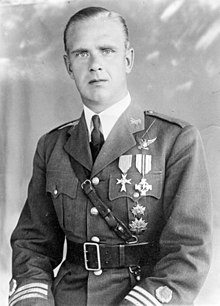Alfons Rebane | |
|---|---|
 Rebane in the Estonian Army | |
| Born | 24 June 1908 Valga, Livonia, Russian Empire |
| Died | 8 March 1976 (aged 67) Augsburg, Bavaria, West Germany |
| Allegiance | |
| Service | Estonian Army (1929–1940) German Army (1941–1944) Waffen-SS (1944–1945) Secret Intelligence Service (1947–1961) |
| Years of service | 1929–1940 1941–1945 1947–1961 |
| Rank | Waffen-Standartenführer, colonel |
| Unit | 1929, 1st Armored Train Regiment 1935, Viljandi County Territorial Regiment 1939, Lääne County Territorial Regiment 1940, Commandant of Lihula 1941, 184th Security Battalion, Wehrmacht 1943, 658th (Estonian) Ost Battalion, Wehrmacht 1944, 20th Waffen Grenadier Division of the SS (1st Estonian) 1947 MI6 |
| Battles / wars | World War II: Eastern Front |
| Awards | Estonian Defence League White Cross 3rd Class Latvian Aizsargi Cross of Merit Iron Cross 2nd & 1st class Infantry Assault Badge Knight's Cross of the Iron Cross with Oak Leaves Close Combat Clasp Eastern Front Medal |
| Other work | MI6 |
Alfons Vilhelm Robert Rebane (24 June 1908 – 8 March 1976) was an Estonian military commander. He was the most highly decorated Estonian military officer during World War II, serving in various Wehrmacht and Waffen-SS units of Nazi Germany.[1]
After World War II Rebane joined the British Secret Intelligence Service (MI6) where he played a key role in assisting the armed resistance to Soviet rule in Estonia and other Baltic countries. He led the Estonian portion of MI6's Operation Jungle well into the 1950s.
In 1961, Rebane retired from the British intelligence services and moved to Germany, where he stayed until his death in Augsburg in 1976. The 1999 reburial of Rebane in Estonia with state honors triggered a number of controversies.